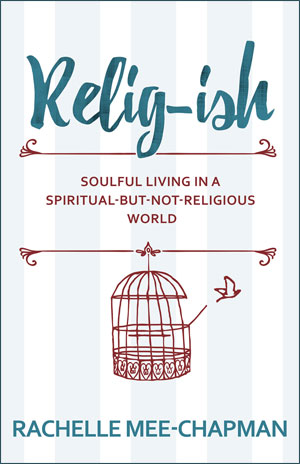 According to data from the Pew Research Center, Americans are becoming less religious, but, simultaneously, more spiritual. Often described as “nones,” these individuals have rejected the trappings of institutional religion, yet still feel “a deep sense of spiritual peace and well-being as well as a deep sense of wonder about the universe.”
According to data from the Pew Research Center, Americans are becoming less religious, but, simultaneously, more spiritual. Often described as “nones,” these individuals have rejected the trappings of institutional religion, yet still feel “a deep sense of spiritual peace and well-being as well as a deep sense of wonder about the universe.”
But, as so many people resoundingly reject the hypocrisy, hate, homophobia, and misogyny of the Christian church, they also often leave behind the spiritually nurturing aspects of religious life and find themselves adrift in a post-church world.
For those who have left the church behind, but don’t want to entirely abandon spiritual practice, and also for those who were never a part of the church, but are still seeking to foster meaningful spiritual development, Rachelle Mee-Chapman’s new book, Relig-ish: Soulful Living in a Spiritual-But-Not-Religious World (Chalice Press, $14.99), serves as a practical guide to negotiating the waters of spirituality that lie just beyond the shores of traditional religion.
Mee-Chapman has traversed these waters herself, having spent thirty years in the Christian church, much of that time as an ordained minister, before moving on in her spiritual journey. Her pastoral sensitivity and spiritual wisdom permeate this small but potent book, and she is adamant that there is fertile ground to be found “between secularism and the religious institutions of Christianity” (1).
Relig-ish affirms the fact that, for many people, abandoning one’s faith isn’t a lazy act, but is “a mindful and appropriate response in an expanding world” (5). Mee-Chapman recognizes the diverse spiritual needs of her audience and carefully guides us through the process of creating “a set of right-fit spiritual practices that are rooted in your history, authentic to who you are today, and creative enough to grow with you” (6).
This “relig-ish tool kit” includes habits and practices often not found, and certainly rarely emphasized, in traditional religion: learning to engage in dialog rather than debate, embracing mystery, fostering creativity, and the establishment of foundational values such as beauty, creativity, compassion, and sustainability.
These tools are put to work deconstructing the religious life by dismantling the toxic theologies of Original Sin and Total Depravity, as well as the less obviously harmful, but potentially just as dangerous, notions of Servanthood and Sacrifice.
Relig-ish then sets out reconstructing a spiritual framework by guiding the reader through developing a personal creed, learning methods of spiritual self-care, and finding rituals that put core values into practice. Mee-Chapman also offers practical advice for rebuilding community, rediscovery sacred spaces, and renewing our understanding of God, sacred texts, prayer, and worship.
Throughout the book, Mee-Chapman recognizes the pain and challenges that are inherent in all these processes. This isn’t a quick-fix manual for finding spiritual enlightenment, it’s a set of pragmatic guidelines for navigating a spiritual journey. She knows that everyone’s journey will be different, and her advice always favors freedom over rigidity. This is a book about choices, about discovery, about love, about nurturing those aspects of the soul that are often all but destroyed by traditional religion.
I have no doubt that Mee-Chapman’s faith (or lack thereof) will run a little too far afield for some readers–she travels well outside the bounds of traditional Christianity. But the wisdom she imparts isn’t applicable to only one particular point on the spiritual spectrum. Her advice for developing meaningful spirituality in all aspects of life is worth heeding regardless of one’s precise profession of faith.
If you’ve left church behind, if Christianity has become a hindrance rather than a help to your spiritual well-being, if you miss church even as you can’t ever imagine darkening its doors again, then Relig-ish offers sensible and realistic help for finding robust spiritual practice in a post-religious world.
 Dan Wilkinson
Dan Wilkinson
Dan is the Executive Editor of the Unfundamentalist Christians blog. He is a writer, graphic designer and IT specialist. He lives in Montana, is married and has three cats.
Leave a Reply